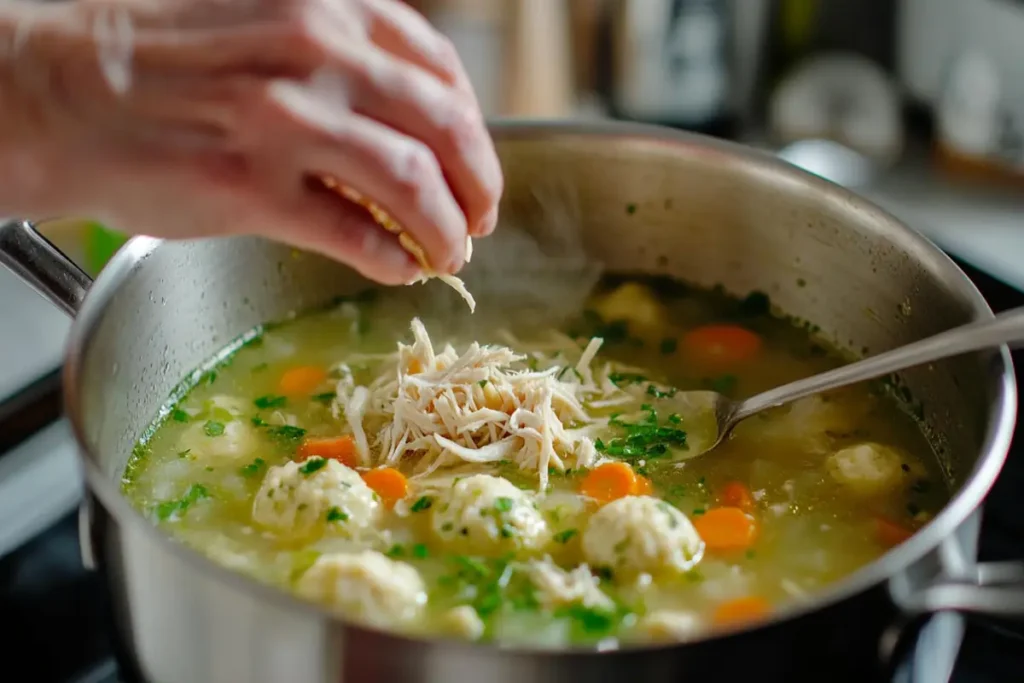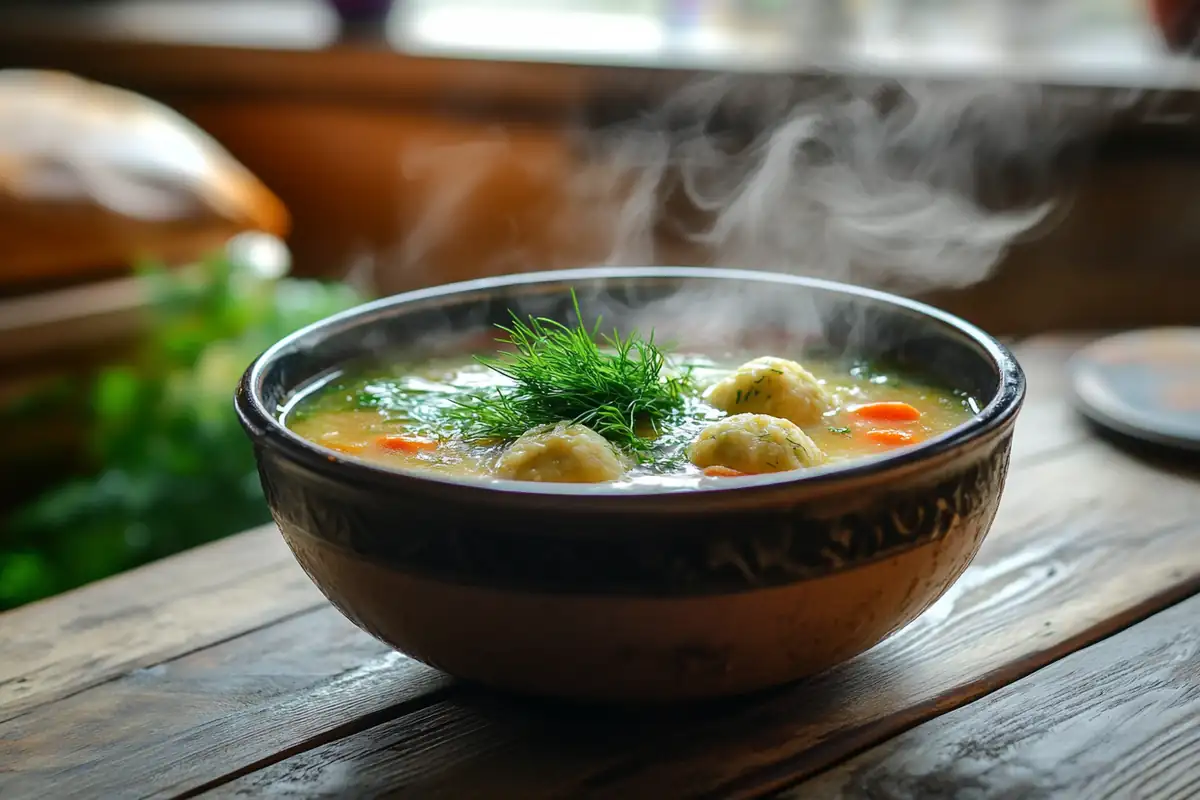A comforting classic, but is matzo ball soup good for you? This article explores its nutritional value and benefits.
Table of contents
- Understanding the Basics of Matzo Ball Soup
- Analyzing the Nutritional Aspects of Matzo Ball Soup
- Delving into the Potential Health Benefits
- Potential Drawbacks to Consider
- Tips for Making Healthier Matzo Ball Soup
- Variations and Alternatives to Explore
- Making Informed Choices About Matzo Ball Soup
- Harmonious Pairings to Complete Your Meal
- Frequently Asked Questions (FAQs):
Understanding the Basics of Matzo Ball Soup

Matzo balls, a key component of the soup.
Matzo ball soup is a traditional dish, often enjoyed during Jewish holidays. It’s typically made with a clear broth, fluffy matzo balls, and sometimes includes chicken or other vegetables. The dish is known for its comforting and warming qualities, but many wonder about its health benefits. Therefore, let’s explore the nutritional aspects of this comforting dish to see if matzo ball soup can be considered a healthy option.
What Makes Up a Traditional Bowl of Matzo Soup?
The main components of matzo ball soup are broth, matzo balls, and any added vegetables or chicken. The broth is usually a simple chicken or vegetable broth, often providing hydration and some electrolytes. Matzo balls are made from matzo meal, eggs, and fat (like oil or chicken fat). They provide some energy, but they are not particularly high in nutrients. The additions of vegetables like carrots, celery, and onion can add some fiber and vitamins to the dish.
Analyzing the Nutritional Aspects of Matzo Ball Soup
The health impact of matzo ball soup varies based on its preparation. Some versions are more nutritious than others. Therefore, let’s break down the components to assess how healthy this dish can be.
The Hydrating Role of the Broth in Matzo Soup
Generally, the broth in matzo ball soup is low in calories and can be very hydrating. However, homemade broths, especially those with chicken, may be higher in sodium. The broth’s benefits include supplying essential electrolytes and some vitamins, depending on the ingredients used.
Matzo Balls: A Closer Look at Their Composition
Matzo balls are often the main focus of the soup. They are made with matzo meal, which is essentially ground matzo crackers, eggs, and fat. Matzo balls primarily offer carbohydrates and some protein, but not much in the way of fiber or a broad spectrum of nutrients. Furthermore, they can be quite dense and may be high in calories, especially when made with a lot of fat.
The Benefits of Added Vegetables
The addition of vegetables certainly makes matzo ball soup more healthy. Carrots, celery, and onions add important vitamins, minerals, and fiber. These additions contribute to a more balanced and nutrient-dense meal.
Protein in Matzo Soup: The Role of Chicken
If chicken is included in the soup, it can provide a significant source of protein, which is essential for building and repairing tissues. Protein can also help with satiety, which can make the meal more satisfying. However, the type and amount of meat can also increase the fat content of the soup.
Delving into the Potential Health Benefits
While matzo ball soup is not necessarily a superfood, it does have some potential health benefits. The soup can provide hydration, electrolytes, and some nutrients, depending on the ingredients. It can also be very comforting, especially when you’re feeling unwell. Let’s take a closer look at the potential health benefits.
Electrolyte Balance: The Hydrating Effect of Matzo Soup
The broth in matzo ball soup is excellent for hydration. Hydration is very important for a wide range of bodily functions. The electrolytes in the broth, particularly sodium, help maintain fluid balance, especially if you have been unwell. Therefore, this makes the soup a great option when you’re sick.
Protein: A Key Nutrient in This Classic Dish
When chicken is included, matzo ball soup provides a good source of protein. Protein helps with muscle repair, immune function, and satiety. Protein-rich foods are important for maintaining overall health and well-being.
Vitamins and Minerals: The Power of Added Veggies
The added vegetables contribute vitamins and minerals to matzo ball soup. Carrots are a great source of vitamin A. Celery provides vitamins and minerals like potassium and calcium. These nutrients are essential for various bodily functions.
Comfort and Warmth: Why We Love Matzo Ball Soup
Matzo ball soup is known as a classic comfort food. The warmth and simplicity of the soup can be very soothing, which can contribute to feelings of well-being and relaxation. Therefore, this can make it a particularly good choice when you’re feeling under the weather or need a comforting meal.
Potential Drawbacks to Consider
Despite its potential benefits, matzo ball soup also has some potential downsides. Some key concerns include the high sodium content, higher carbohydrate content, and potentially high calorie count. These considerations are important for making conscious and informed choices about your diet.
Sodium: The Hidden Culprit in Many Recipes
Many matzo ball soup recipes, especially those using canned broths or bouillon, can be quite high in sodium. Consuming high levels of sodium can negatively impact health, potentially increasing blood pressure and contributing to other health issues. Therefore, making soup at home and controlling sodium levels is important.
Carbohydrates: Understanding the Impact of Matzo Balls
The matzo balls are largely made of carbohydrates. While carbohydrates are an important source of energy, consuming higher amounts of carbohydrates can have a negative impact for some people, especially those limiting carbohydrates in their diet or those with diabetes. It is essential to be aware of portion sizes to manage carbohydrate intake.
Calories: Keeping an Eye on Serving Sizes
Depending on the recipe, matzo ball soup can be high in calories. The fat used in the matzo balls and any added meat can increase the calorie count considerably. Therefore, being aware of the fat content and watching portion sizes is very important when maintaining a balanced diet.
Digestive Sensitivities: When Matzo Balls Might Cause Issues
For some, matzo balls may be hard to digest due to their density. This can potentially lead to bloating or discomfort for some individuals. Therefore, if you’re experiencing digestive issues, it may be best to have smaller portions of the soup.
Tips for Making Healthier Matzo Ball Soup

Adding vegetables to make matzo ball soup more nutritious.
If you enjoy matzo ball soup but want to make it a healthier option, there are some changes you can make. Some simple adjustments can lower the sodium, calories, and fat content of the dish, all while maintaining its deliciousness. Let’s look at some ways to create a healthier version of this classic soup.
Smart Swaps: Reducing Sodium in Your Broth
Using low-sodium or no-salt-added broths is important to limiting sodium content. You can control the amount of sodium by making your own broth or being careful with the soup you buy. Herbs and spices can be used to compliment the flavor without having to add salt.
Lighter Matzo Balls: Lowering the Fat Content
You can make matzo balls using less oil or fat. Another way to lower fat is to use vegetable oil instead of chicken fat. Also, limiting the amount of fat added can also help keep the dish low in calories.
Boosting Nutrients: Adding More Vegetables
Increasing the quantity of vegetables can help boost the fiber, vitamin, and mineral content of the soup. You can add a wide variety of vegetables, including carrots, celery, zucchini, and peas. Adding more vegetables enhances the soup’s nutritional profile.
Choosing the Right Protein: Lean Options for a Healthier Dish
Using lean proteins, like skinless chicken breast, can reduce the overall fat content of the soup. When using chicken, make sure you remove the skin to lower saturated fat content. Therefore, using lean proteins improves the health value of your matzo ball soup.
The Power of Portion Control: Moderating Your Intake
Keeping an eye on portion sizes is essential when maintaining a healthy diet. Limiting your matzo ball intake is an easy way to lower the overall calories and carbohydrates you consume. Therefore, being mindful of portion size is very important.
Variations and Alternatives to Explore
Matzo ball soup can be quite versatile. There are many variations and alternatives that cater to different dietary needs and preferences. It is fun to explore some of these options to find what fits you best.
Gluten-Free Options: Adapting for Dietary Needs
Gluten-free matzo balls can be made with gluten-free matzo meal or other alternative flours, such as almond or rice flour. These options allow people with gluten intolerance or celiac disease to enjoy matzo ball soup without discomfort. Therefore, gluten-free alternatives make this soup accessible to more people.
Vegetarian Versions: A Meat-Free Approach
Vegetarian versions of matzo ball soup use vegetable broth instead of chicken broth. The matzo balls can also be modified to be vegetarian or even vegan, by using egg alternatives. These vegetarian alternatives allow more people to enjoy this comforting dish.
Low-Carb Options: Smart Choices for Restricting Carbs
People on low-carb diets can reduce the carbohydrate content by using smaller portions of matzo balls or using low-carb alternatives such as cauliflower or almond flour. Limiting carbohydrates in this way is important when trying to maintain a low-carb diet.
Customizing Your Soup: Adding Different Proteins and Vegetables
Adding different proteins such as turkey or tofu, can change the profile of this soup. Furthermore, adding a variety of vegetables can provide a more balanced and nutrient-rich meal. There are endless variations of this dish, so there are lots of ways to enjoy the classic dish in a healthier way.
Making Informed Choices About Matzo Ball Soup
In conclusion, matzo ball soup, can be a part of a healthy diet if consumed in moderation and with some thoughtful adjustments. While it provides hydration, some nutrients, and can be comforting, its high sodium, carbohydrate, and potentially high-calorie content should be kept in mind. With some mindful choices, you can enjoy this classic dish while maintaining a balanced and healthy lifestyle. Therefore, it is essential to make informed decisions about your food choices.
Understanding Your Needs: Making the Right Choice for You
Ultimately, the decision to include matzo ball soup in your diet depends on your personal health needs and preferences. Consider factors like sodium intake, carbohydrate goals, and overall calorie targets. Making informed choices is essential for maintaining a healthy and balanced diet.
Enjoying in Moderation: The Key to a Balanced Diet
Matzo ball soup, like any other food, can be enjoyed as part of a balanced diet. By focusing on portion control, choosing healthier ingredients, and being mindful of how the dish fits into your overall eating plan, you can enjoy it without guilt. Therefore, you can savor the dish while also supporting your health and well-being.
Harmonious Pairings to Complete Your Meal
Exploring food pairings can enhance your experience of matzo ball soup. The right sides can not only compliment the soup but also make it a complete and satisfying meal. Therefore, let’s consider some good food pairings.
Side Dishes: What Goes Well with Matzo Ball Soup
A simple green salad can add freshness and fiber to your meal. Whole grain bread or crackers can also compliment the soup. These add complex carbohydrates and additional fiber. These pairings can help create a more balanced meal.
Beverage Choices: Pairing Drinks with Your Soup
A glass of water is perfect for staying hydrated alongside the soup. Unsweetened tea or sparkling water are other healthy options that can help balance the meal without adding additional sugar or calories. These simple pairings make the most of your experience.
Sweet Endings: Pairing Desserts with Matzo Ball Soup
A small serving of fresh fruit can provide a nice balance and add a touch of natural sweetness. A small portion of dark chocolate can also satisfy sweet cravings without overdoing it. These are great ways to end your meal. Therefore, it’s all about finding the right balance for a more satisfying dining experience.
Conclusion
Matzo ball soup offers comfort and some nutritional benefits when made with healthy ingredients and eaten in moderation. The broth provides hydration, and added vegetables offer fiber, vitamins, and minerals. However, it’s essential to be mindful of the sodium, carbohydrate, and calorie content, especially if you’re watching your diet. By choosing low-sodium broths, reducing fat in the matzo balls, and adding vegetables, you can make matzo ball soup a healthier meal. Enjoying it as part of a balanced diet and paying attention to portion sizes are also important. Ultimately, matzo ball soup can be a satisfying and nutritious choice if prepared and consumed with care.
Frequently Asked Questions (FAQs):
Matzah ball soup can be a good option if prepared with healthy ingredients. The soup provides hydration and some nutrients, especially with added vegetables and lean protein. However, be mindful of the sodium and carbohydrate content, and make sure to watch portion sizes.
The calories in matzo ball soup can vary. However, a typical serving may have around 200-400 calories. This can change based on the size of the serving, the type of broth, the amount of fat in the matzo balls, and the additions.
Matzo, a flat, unleavened bread, is mostly carbohydrates. It doesn’t contain significant amounts of vitamins, minerals, or fiber, meaning it doesn’t offer a lot of nutrients compared to other grains. It is important to remember that it is not a very nutrient-dense food.
For some people, matzo balls can be difficult to digest, which can lead to bloating. This is due to their dense texture and high carbohydrate content. If you have digestive issues, make sure you eat them in moderation, or consider other alternatives.

